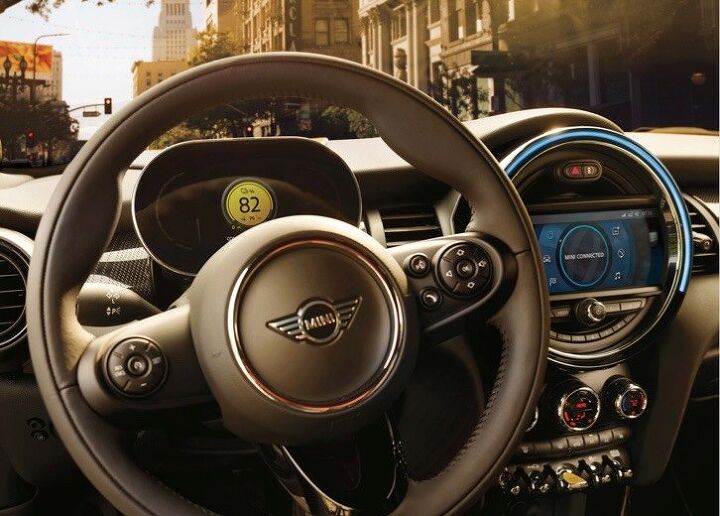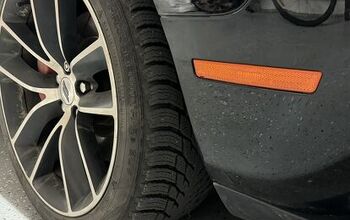Cheap Electronics: 2020 Mini Cooper SE Pricing Announced

Our big concern for Mini’s upcoming electric hatchback was that it wouldn’t have sufficient range to make sense in the United States. The company seemed to be more interested in producing a rambunctious urban runabout, rather than something that could serve as a do-anything, go-anywhere EV. But we figured we’d wait to see where BMW Group planned on pricing the thing before folding arms and furrowing brows.
As it turns out, the Mini Cooper SE’s starting MSRP will be $30,750 (including destination). While that undercuts the cost of some “rival” models by several grand, the Mini EV brings less to the party.
The front-wheel-drive SE makes 181 horsepower and 199 lb-ft of torque, pulling the entirety of that energy from a 32.6-kWh battery pack. Zero to 60 takes a relatively brisk 6.9 seconds and the car tops out at 93 mph. Recharge times are said to be an enviable four hours, using a 7.4 kW home AC charging port, with fast-charge stations returning 80 percent of the vehicle’s maximum range in just 35 minutes.
Our own Environmental Protection Agency usually tamps down Europe’s WLTP testing-cycle estimates, meaning the 146-mile range Mini has promised for the SE will likely come down a bit when the car goes on sale in the United States. Nissan’s base Leaf is priced within a few bucks of the electric Mini and comes with a larger 40 kW battery pack that’s guaranteed to deliver more miles per charge.
While that makes it look like an easy victory for the Leaf, and every other EV offering superior range for a few thousand extra dollars (Tesla Model 3, Chevrolet Bolt, etc.), Mini believes the brand’s fun factor and upscale appeal will help see it through. It’s acceleration could be trumped by a Leaf Plus… but the handling should be a lock. BMW Group has suggested the Mini Cooper SE has retained the gas-driven Hardtop’s nimble demeanor — making it ideal around town, where its diminished range will be less of an issue. The manufacturer also said it views the smaller battery as an opportunity to save weight. But we would liked to have seen something larger and more practical, consequences be damned.
New standard features include a smartphone app that allows you to control the vehicle’s climate settings from afar, new 5.5-inch digital gauge display (above), heated front seats, and a driver assistance suite the company plans on explaining in greater detail closer to its American launch.
We’ll see how receptive the public is next year. Expect to see the 2020 Mini Cooper SE going on sale in March.

A staunch consumer advocate tracking industry trends and regulation. Before joining TTAC, Matt spent a decade working for marketing and research firms based in NYC. Clients included several of the world’s largest automakers, global tire brands, and aftermarket part suppliers. Dissatisfied with the corporate world and resentful of having to wear suits everyday, he pivoted to writing about cars. Since then, that man has become an ardent supporter of the right-to-repair movement, been interviewed on the auto industry by national radio broadcasts, driven more rental cars than anyone ever should, participated in amateur rallying events, and received the requisite minimum training as sanctioned by the SCCA. Handy with a wrench, Matt grew up surrounded by Detroit auto workers and managed to get a pizza delivery job before he was legally eligible. He later found himself driving box trucks through Manhattan, guaranteeing future sympathy for actual truckers. He continues to conduct research pertaining to the automotive sector as an independent contractor and has since moved back to his native Michigan, closer to where the cars are born. A contrarian, Matt claims to prefer understeer — stating that front and all-wheel drive vehicles cater best to his driving style.
More by Matt Posky
Latest Car Reviews
Read moreLatest Product Reviews
Read moreRecent Comments
- Ajla My understanding is that the 5 and 7-Series cater almost exclusively to the Chinese market and they sell them here just so they don't look weak against Mercedes and Audi.
- EBFlex Interesting. We are told there is insatiable demand for EVs yet here is another major manufacturer pivoting away from EV manufacturing and going to hybrid. Did these manufacturers finally realize that the government lied to them and that consumers really don’t want EVs?
- Kwik_Shift_Pro4X What's worse than a Malibu?
- MaintenanceCosts The current Malibu is poorly packaged; there's far more room inside a Camry or Accord, even though the exterior footprint is similar. It doesn't have any standout attributes to balance out the poor packaging. I won't miss it. But it is regrettable that none of our US-based carmakers will be selling an ordinary sedan in their home market.
- Jkross22 You can tell these companies are phoning these big sedans in. Tech isn't luxury. Hard to figure out isn't luxury.This looks terrible, there are a lot of screens, there's a lot to get used to and it's not that powerful. BMW gave up on this car along time ago. The nesting doll approach used to work when all of their cars were phenomenal. It doesn't work when there's nothing to aspire to with this brand, which is where they are today. Just had seen an A8 - prior generation before the current. What a sharp looking car. I didn't like how they drove, but they were beautifully designed. The current LS is a dog. The new A8 is ok, but the interior is a disaster, the Mercedes is peak gaudy and arguably Genesis gets closest to what these all should be, although it's no looker either.





































Comments
Join the conversation
This will be an interesting test case. The 80-mile crop of compliance cars like the original Leaf, e-Golf, Focus Electric, etc. clearly didn't have enough range even to be a useful second car for many people. But I think this is enough range for a second car, and it's usefully cheaper than long-range EVs. It should also be eligible for a tax credit that will make its net price $25k or so for well-heeled buyers. I suspect it might sell decently, taking into account the malaise that's affecting the Mini brand overall since the cars turned into restyled 1-series.
I support their choice of a smaller, lighter battery to retain some semblance of handling characteristics. As a commuter car, it would likely suffice to plug into a standard outlet every day or every other day. I like the styling and retro interior of the Mini, though I would have preferred a sub 6 second 0-60.